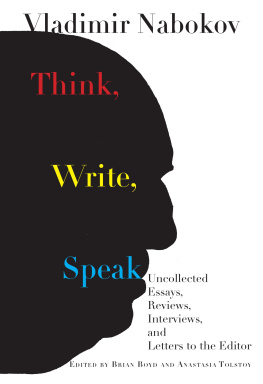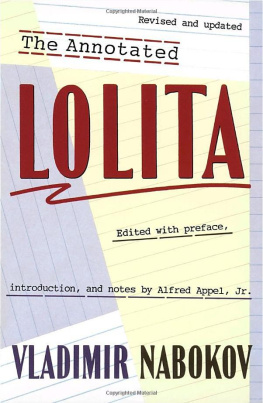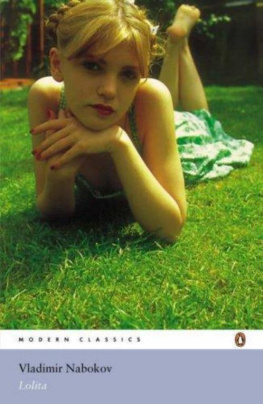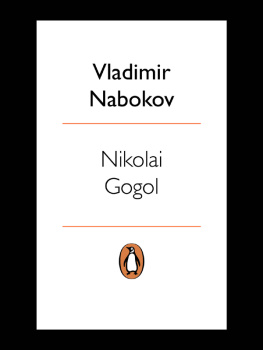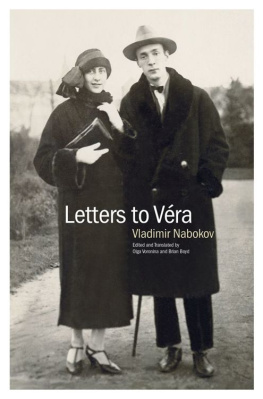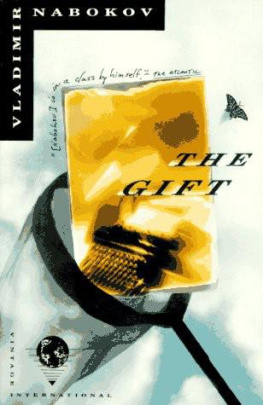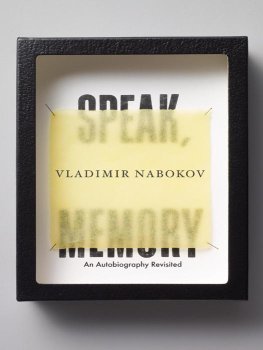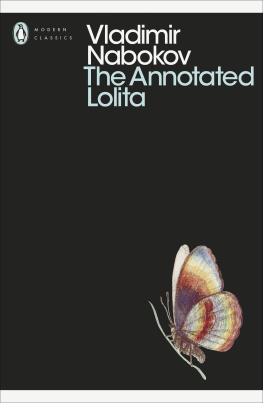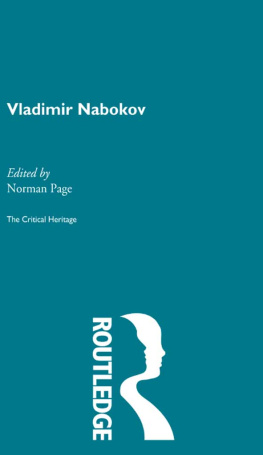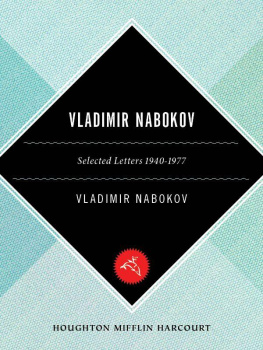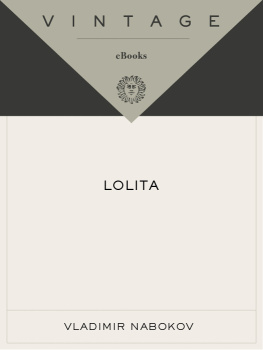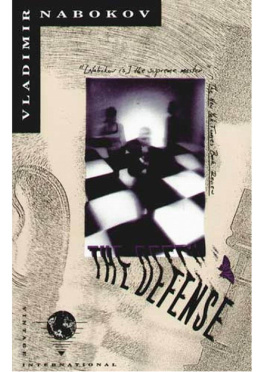Vladimir Nabokov - The eye
Here you can read online Vladimir Nabokov - The eye full text of the book (entire story) in english for free. Download pdf and epub, get meaning, cover and reviews about this ebook. City: New York, year: [2011], publisher: Vintage International/Vintage Books, genre: Detective and thriller. Description of the work, (preface) as well as reviews are available. Best literature library LitArk.com created for fans of good reading and offers a wide selection of genres:
Romance novel
Science fiction
Adventure
Detective
Science
History
Home and family
Prose
Art
Politics
Computer
Non-fiction
Religion
Business
Children
Humor
Choose a favorite category and find really read worthwhile books. Enjoy immersion in the world of imagination, feel the emotions of the characters or learn something new for yourself, make an fascinating discovery.

- Book:The eye
- Author:
- Publisher:Vintage International/Vintage Books
- Genre:
- Year:[2011]
- City:New York
- Rating:5 / 5
- Favourites:Add to favourites
- Your mark:
- 100
- 1
- 2
- 3
- 4
- 5
The eye: summary, description and annotation
We offer to read an annotation, description, summary or preface (depends on what the author of the book "The eye" wrote himself). If you haven't found the necessary information about the book — write in the comments, we will try to find it.
The eye — read online for free the complete book (whole text) full work
Below is the text of the book, divided by pages. System saving the place of the last page read, allows you to conveniently read the book "The eye" online for free, without having to search again every time where you left off. Put a bookmark, and you can go to the page where you finished reading at any time.
Font size:
Interval:
Bookmark:
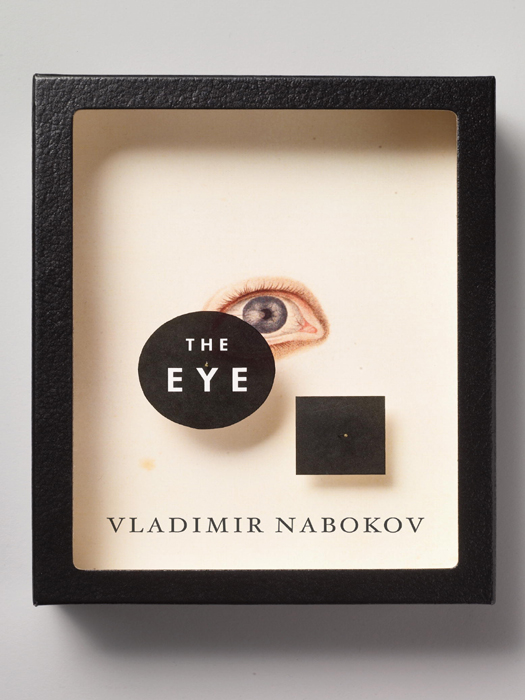

BOOKS BY Vladimir Nabokov
NOVELS
Mary
King, Queen, Knave
The Defense
The Eye
Glory
Laughter in the Dark
Despair
Invitation to a Beheading
The Gift
The Real Life of Sebastian Knight
Bend Sinister
Lolita
Pnin
Pale Fire
Ada or Ardor: A Family Chronicle
Transparent Things
Look at the Harlequins!
SHORT FICTION
Nabokovs Dozen
A Russian Beauty and Other Stories
Tyrants Destroyed and Other Stories
Details of a Sunset and Other Stories
The Enchanter
DRAMA
The Waltz Invention
Lolita: A Screenplay
The Man from the USSR and Other Plays
AUTOBIOGRAPHY AND INTERVIEWS
Speak, Memory: An Autobiography Revisited
Strong Opinions
BIOGRAPHY AND CRITICISM
Nikolai Gogol
Lectures on Literature
Lectures on Russian Literature
Lectures on Don Quixote
TRANSLATIONS
Three Russian Poets: Translations of Pushkin,
Lermontov, and Tiutchev
A Hero of Our Time (Mikhail Lermontov)
The Song of Igors Campaign (Anon.)
Eugene Onegin (Alexander Pushkin)
LETTERS
Dear Bunny, Dear Volodya:
The Nabokov-Wilson Letters, 19401971
Vladimir Nabokov: Selected Letters, 19401977
MISCELLANEOUS
Poems and Problems
The Annotated Lolita
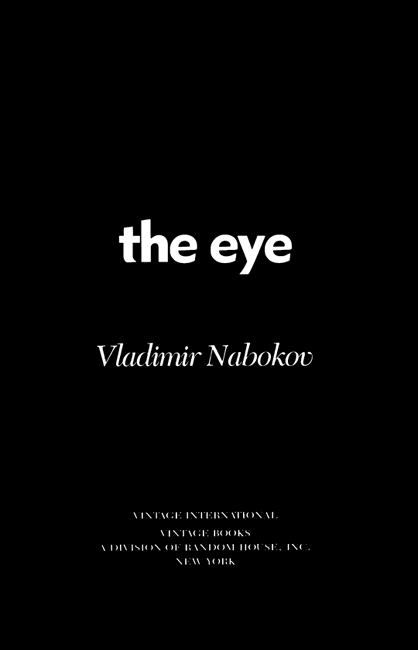

F IRST V INTAGE I NTERNATIONAL E DITION , S EPTEMBER 1990
Copyright 1965 by Vladimir Nabokov
All rights reserved under international and Pan-American
Copyright Conventions. Published in the United States by
Vintage Books, a division of Random House, Inc., New York.
Originally published in hardcover by Phaedra Publishers, Inc.,
in 1965. This edition published by arrangement with the Estate
of Vladimir Nabokov.
Library of Congress Cataloging-in-Publication Data
Nabokov, Vladimir Vladimorovich, 18991977.
The eye / by Vladimir Nabokov1st Vintage international ed.
p. cm.(Vintage international)
eISBN: 978-0-307-78756-9
I. Title.
PS3527.A15E9 1990
813.54dc20 90-50265
Cover art by John Gall
Cover photograph by Alison Gootee
v3.1
Translated by Dmitri Nabokov
in collaboration with the author
To Vra
The Russian title of this little novel is SOGLYADATAY (in traditional transliteration), pronounced phonetically Sugly-dart-eye, with the accent on the penultimate. It is an ancient military term meaning spy or watcher, neither of which extends as flexibly as the Russian word. After toying with emissary and gladiator, I gave up trying to blend sound and sense, and contented myself with matching the eye at the end of the long stalk. Under that title the story weaved its pleasant way through three installments of PLAYBOY in the first months of 1965.
I composed the original text in 1930, in Berlinwhere my wife and I rented two rooms from a German family on quiet Luitpoldstrasseand at the end of that year it appeared in the Russian emigr review SOVREMENNYYA ZAPISKI in Paris. The people in the book are the favoritecharacters of my literary youth: Russian expatriates living in Berlin, Paris, or London. Actually, of course, they might just as well have been Norwegians in Naples or Ambracians in Ambridge: I have always been indifferent to social problems, merely using the material that happened to be near, as a voluble diner pencils a street corner on the table cloth or arranges a crumb and two olives in a diagrammatic position between menu and salt cellar. One amusing result of this indifference to community life and to the intrusions of history is that the social group casually swept into artistic focus acquires a falsely permanent air; it is taken for granted at a certain time in a certain place, by the emigr writer and his emigr readers. The Ivan Ivanovich and Lev Osipovich of 1930 have long been replaced by non-Russian readers who are puzzled and irritated today by having to imagine a society they know nothing about; for I do not mind repeating again and again that bunches of pages have been torn out of the past by the destroyers of freedom ever since Soviet propaganda, almost half a century ago, misled foreign opinion into ignoring or denigrating the importance of Russian emigration (which still awaits its chronicler).
The time of the story is 19245. Civil War in Russia has ended some four years ago. Lenin has just died but his tyranny continues to flourish. Twenty German marks are not quite five dollars. The expatriates in the Berlin of the book range from paupers to successful businessmen. Examples of the latter are Kashmarin, Matildas cauchemaresquehusband (who evidently escaped from Russia by the southern route, via Constantinople), and the father of Evgenia and Vanya, an elderly gentleman (who judiciously directs the London branch of a German firm, and keeps a dancing girl). Kashmarin is probably what the English call middleclass, but the two young ladies at 5 Peacock Street obviously belong to the Russian nobility, titled or untitled, which does not prevent them from having Philistine reading tastes. Evgenias fat-faced husband, whose name sounds rather comic today, works in a Berlin bank. Colonel Mukhin, a nasty prig, fought in 1919 under Denikin, and in 1920 under Wrangel, speaks four languages, affects a cool, worldly air, and will probably do very well in the soft job into which his future father-in-law is steering him. Good Roman Bogdanovich is a Balt imbued with German, rather than Russian, culture. The eccentric Jew Weinstock, the pacifist woman doctor Marianna Nikolaevna, and the classless narrator himself are representatives of the many-faceted Russian intelligentsia. These tips should make things a little easier for the kind of reader who (like myself) is wary of novels that deal with spectral characters in unfamiliar surroundings, such as translations from the Magyar or the Chinese.
As is well known (to employ a famous Russian phrase), my books are not only blessed by a total lack of social significance, but are also mythproof: Freudians flutter around them avidly, approach with itching oviducts, stop, sniff, and recoil. A serious psychologist, on the otherhand, may distinguish through my rain-sparkling crystograms a world of soul dissolution where poor Smurov only exists insofar as he is reflected in other brains, which in their turn are placed in the same strange, specular predicament as his. The texture of the tale mimics that of detective fiction but actually the author disclaims all intention to trick, puzzle, fool, or otherwise deceive the reader. In fact, only that reader who catches on at once will derive genuine satisfaction from THE EYE . It is unlikely that even the most credulous peruser of this twinkling tale will take long to realize who Smurov is. I tried it on an old English lady, two graduate students, an ice-hockey coach, a doctor, and the twelve-year-old child of a neighbor. The child was the quickest, the neighbor, the slowest
Font size:
Interval:
Bookmark:
Similar books «The eye»
Look at similar books to The eye. We have selected literature similar in name and meaning in the hope of providing readers with more options to find new, interesting, not yet read works.
Discussion, reviews of the book The eye and just readers' own opinions. Leave your comments, write what you think about the work, its meaning or the main characters. Specify what exactly you liked and what you didn't like, and why you think so.

